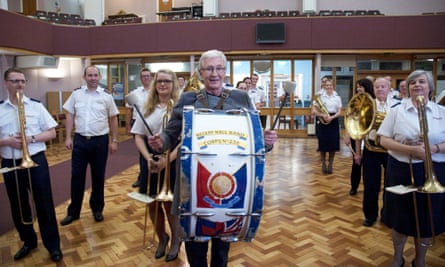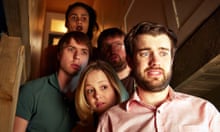‘You know what this reminds me of?” said evil arms dealer Hugh Laurie to alarmingly buff undercover hero Tom Hiddleston as they took coffee in Cairo’s Nefertiti hotel. “Winston Churchill and TE Lawrence dividing up the Middle East over champagne and a cigar. Drew a map on a napkin. Shook hands. Kings of Arabia.”
“I’m guessing that you’re Churchill in this scenario,” said Hiddleston.
“If you insist,” retorted Laurie oleaginously.
Classic last reel hubris from the worst man in the world. Little did Laurie’s character, Dickie Roper, know that within the hour, his multimillion-dollar arms deal would have gone west thanks to Hiddleston’s machinations. Nor that Hiddleston’s handler Olivia Colman would shoot Laurie’s security goon in the leg and in so doing free his tortured, traitorous girlfriend from the clutches of the arms dealers’ entourage. Nor that in Roper’s takedown, Colman would expose corruption at the highest level of Britain’s security services.
I don’t mean to suggest, incidentally, that everyone in Dickie Roper’s entourage reminded me of the government front bench, but it was striking that it consisted of entirely of invertebrate poshos, disappointed-looking middle-aged women and throwbacks who proved useless when things got tough. The Night Manager (BBC1), which finished last night, may have been a stylish and trenchant espionage drama of, no doubt, award-garnering brilliance. It may have explored the nature of good and evil, arms smuggling, the refugee crisis, the aftermath of the Arab spring, and Britain’s post-colonial role in the world. But I couldn’t take it entirely seriously. Why? Because of Hugh Laurie’s mid-Atlantic accent. Thirty years ago he used a similar one in A Bit of Fry and Laurie when the double act did a sketch about two testosterone-charged, Uttoxeter-based health club entrepreneurs. Unwittingly, Laurie was there preparing for his role as Roper’s risible Alpha Male businessman and, effectively, satirising this adaptation of John Le Carré’s novel.

“Dammit, Peter, maybe you’re right,” said Fry all those years ago. “You’re damn right maybe I’m right,” said Laurie. “Damn, double damn, and an extra pint of damn for the weekend,” said Fry. “Daaaamn!” said Laurie.
Marvellously daft. And so were the best lines in this adaptation, if sometimes apparently unwittingly so. “Nothing quite as pretty as napalm at night,” Laurie said in the penultimate episode, channelling Robert Duvall from Apocalypse Now, as his goons lit up a Turkish village to impress venal arms buyers. “Losing at daddy’s casino, Freddie,” he told the two-dimensional Arab baddie last night, “has to be a metaphor for something.” And then there was the moment he confronted his new henchman Hiddleston for murdering his former henchman Tom Hollander. “He was a good man, Corks. Now he’s lying in a ditch in Turkey because of you.”
I’m not sure who made me more uneasy, Tom Hollander as Roper’s drunken, reptilian henchman or Elizabeth Debicki as a statuesque, self-loathing kept woman with her unremitting range of scanty designer outfits. Both were stereotypes who’d stumbled in from another millennium.

Last night Laurie tried to intimidate Olivia Colman. Fool! Didn’t he know that Colman can do no wrong, with the possible exception of the second series of Broadchurch? Even though her character was heavily pregnant, frumpy and had an unconvincing northern accent, Colman had him on toast. “Who are you in the grand scheme of things?” he snootily asked her just before he got his comeuppance. “In the grand scheme of things, I don’t know. I live in Bermondsey.” A great comeback, though, given Thames-side gentrification parameters, not as decisive as it would have been a decade ago.
Minutes later, a grin spread across Colman’s face as she saw that some very scary Egyptian thugs were climbing into the police van to whisk him away for impromptu extra-legal unpleasantness. I don’t know whether director Susanne Bier was intentionally quoting the final scene from The Long Good Friday, but Laurie, who up to that point might have suspected he would be back on the streets come cocktail hour, looked as terrified as Bob Hoskins did when he was driven off to his doom by IRA hoods.

In a Bournemouth churchyard, a homeless man recognised the bloke who was serving him from the soup kitchen. “Paul O’Grady? I always watch you when I’m in jail.”
The Scouse funnyman, former care worker, and agnostic sinner (“If I went to confession you’d probably need a team of priests working through the night with a couple of exorcists thrown in”) was training to be an Army volunteer in The Sally Army and Me (BBC1). Why? O’Grady explained that his fondness for the Salvation Army had much to do with how its volunteers worked in Aids wards during the 1980s while some nurses, he said, would not.
It’s a good time for this series, not just because the Christian charity is the second largest provider of social care in Britain – after the state – but also today the UK’s welfare state is so increasingly porous a safety net that 4,500 people sleep rough on our streets every night.
Why, O’Grady asked, do Sally Army members wash homeless people’s feet? To emulate what Jesus did with his disciples, said his mentor Captain Jo Moir. But there’s more to it than that. Tender physical contact makes those on the receiving end feel, O’Grady suggested, that they are not, as they spend much of the rest of their lives being treated as, untouchable.
In the end, O’Grady couldn’t quite bring himself to emulate Jesus. Perhaps he was put off by the photos he saw of a the feet of a man whom an Army volunteer had cared for - they were covered with terrible sores where he’d injected himself. Instead, he sat in the porch of a church, chatting and trading gags with homeless men, while a volunteer washed feet, cut nails and rubbed in moisturiser. There isn’t yet a show called Celebrity Foot Wash. But, what with rising austerity, and the dearth of new ideas for charity fundraisers and celebrity TV turns, there soon might be.









Comments (…)
Sign in or create your Guardian account to join the discussion